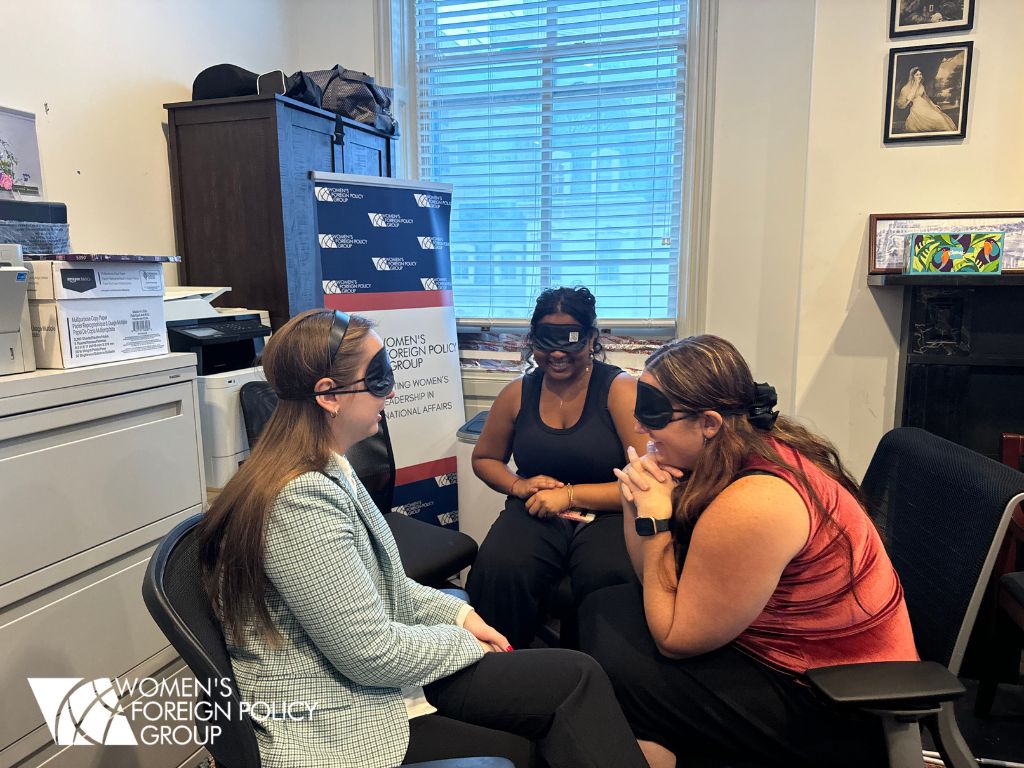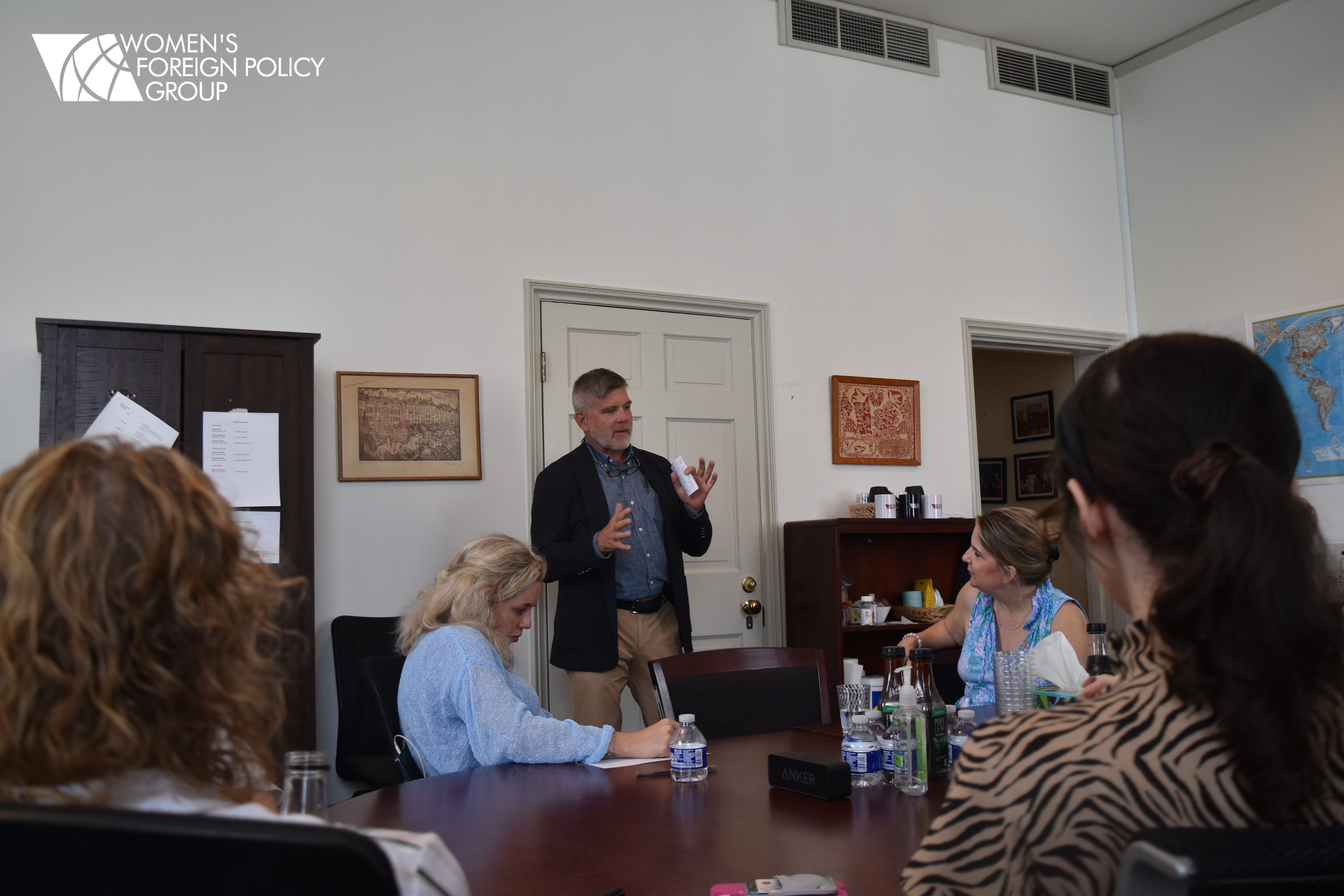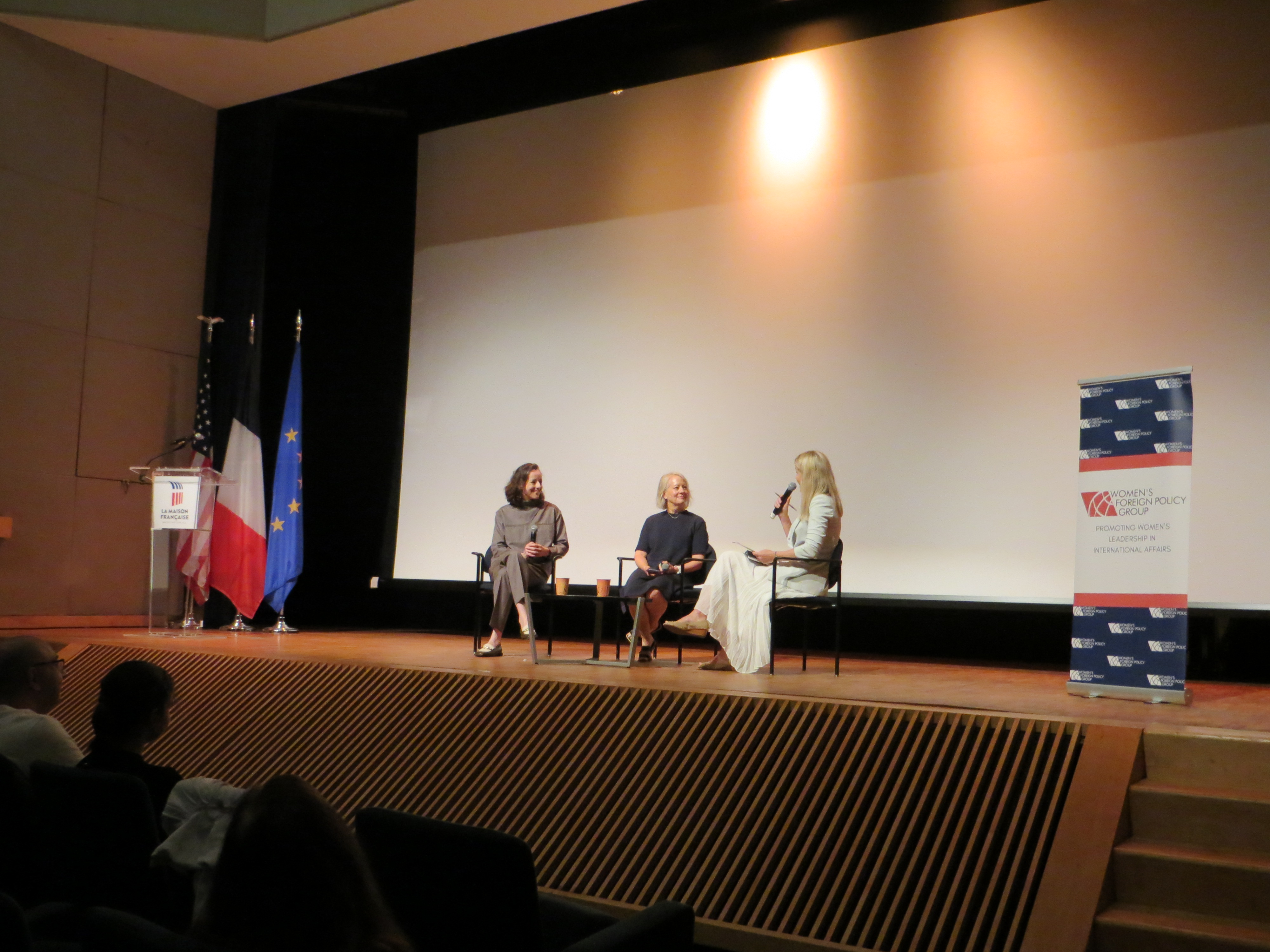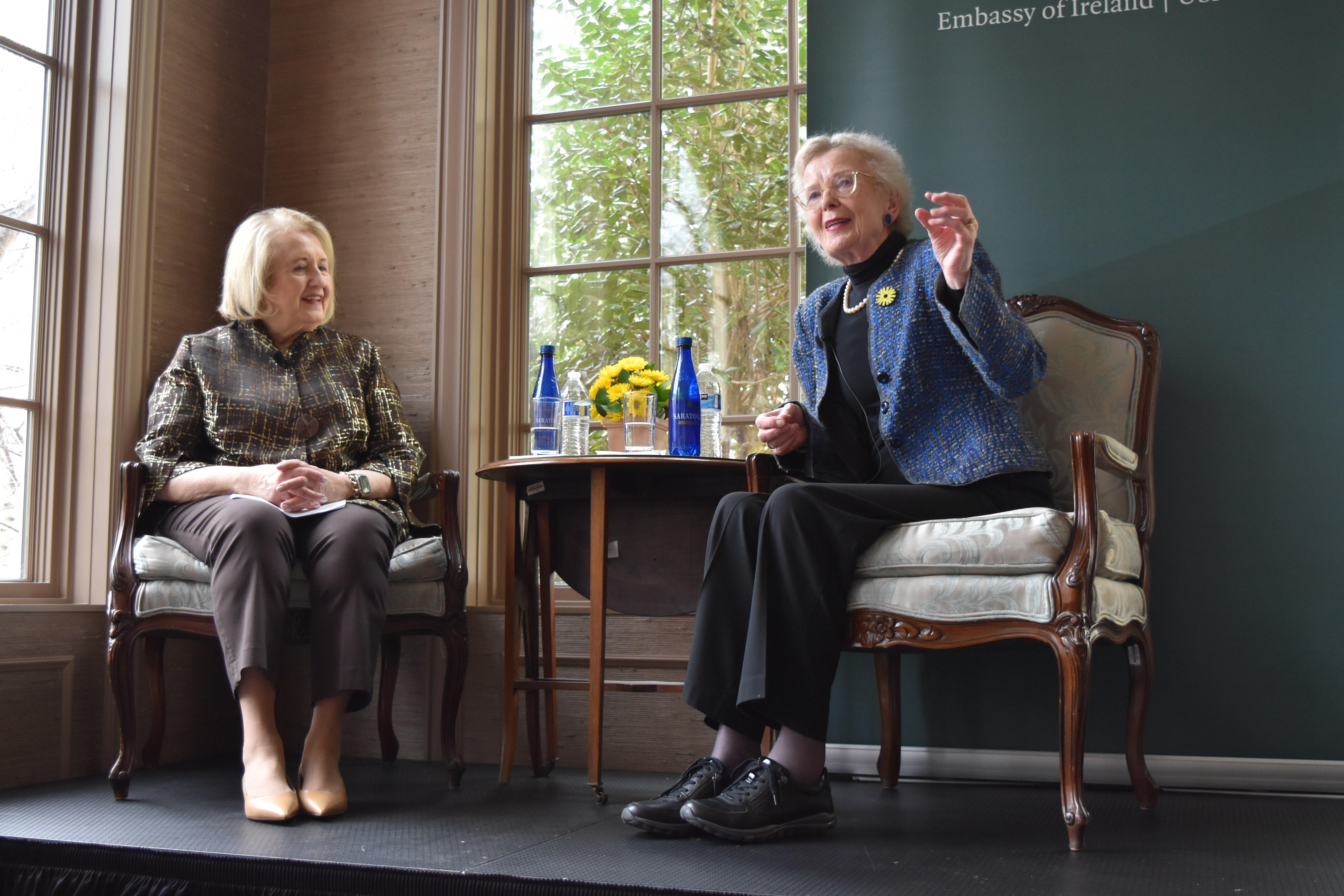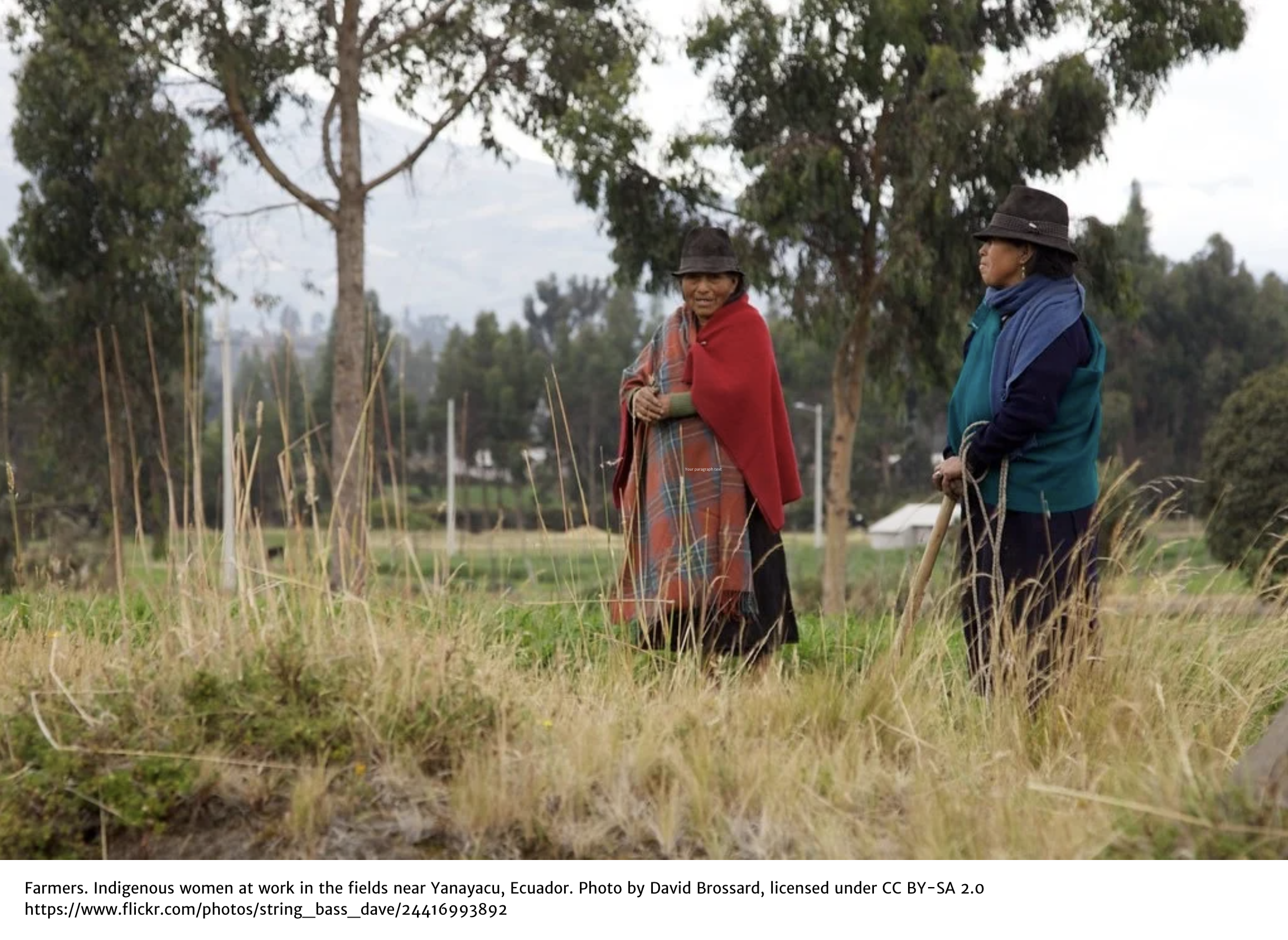
VOICES, is a forum that highlights the expertise of those who make up and support the organization. WFPG members and partners are invited to submit blog posts on international affairs and foreign policy topics, women's leadership, and career advancement. Posts represent the reflections and personal views of members and guest bloggers and not those of their employers or of the WFPG. Interested in submitting a post? Guidelines | Membership
BLOG ARCHIVES | 2025 | 2024 | 2023 | 2022 | 2021 | 2020 | 2019
On the evening of Wednesday, September 17th, WFPG hosted “In the Dark: Exploring Influence, Power, & Perspectives in Foreign Policy,” an experience led by Sara Minkara, the former U.S. Special Advisor on International Disability Rights. I had the opportunity to experience the session firsthand as a participant. To begin, I was blindfolded in a room adjoining the WFPG suite, and I was then led to my seat. As Ms. Minkara began the session I sat in my group of four blindfolded participants, and we were each instructed not to provide any identifying details such as our name, job position, or where we were from. Ms. Minkara prompted us to instead focus our conversations on how society perceives us and how we perceive other people, leading us to introduce and share about ourselves in ways we never had before. I became more at ease as the experience progressed. Despite our differences in professional experience and backgrounds, the blindfolded conversation allowed my group to connect on a deeper level, in a way that almost felt like meditation. At the end of the session, we removed our blindfolds to see who we had been speaking with for almost an hour. Reflecting on this experience, I realized that the session itself was antithetical to more traditional D.C. networking. I feel like I connected with my group on a human level instead of on a professional level, allowing us to move past traditional conversation barriers and inherent judgments. I discovered that my experiences and thought processes were shared by my group in a way I never would have in a normal professional conversation. My “In the Dark” experience was overwhelmingly positive and led me to new discoveries about myself. While the experience had us blindfolded, or literally in the dark, it succeeded in helping me and other attendees become more enlightened about our perceptions of ourselves and others. Zoe V. Balk is a recent graduate of Bryn Mawr College with a degree in International Studies and Chinese language and a Communication intern at WFPG.
Inside the WFPG Suite on a stormy July afternoon, our team prepared to welcome Glenn Corn, former Senior Executive at the Central Intelligence Agency (CIA), for an exclusive deep-dive into the world of espionage. When afternoon showers drove our previously planned immersive DC spy tour indoors, Corn had the impressive task of transporting our imaginations from a booth at the Old Ebbitt Grill on a spring day in 1941, to the expanse of the contemporary Russian-Finnish border, all through the art of storytelling. Corn came to us through our partnership with Spyher, an organization founded in 2021 by former CIA officer Rosanna Minchew that delivers interactive spy-themed tours across the city. This Spyher session, curated specifically for WFPG members, centered around local Russian espionage sites in downtown Washington, DC, mere blocks from the WFPG office. As he set the scene, Corn began by telling the gripping story of Operation Snow. We learned about how conspirator Harry Dexter White, a Communist sympathizer with the ear of President Roosevelt, met with Soviet intelligence agent Vitalii Pavlov at DC’s very own Old Ebbitt Grill. Shortly thereafter, White indirectly influenced the Japanese attack on Pearl Harbor. We also explored the origins of the Silvermaster Group, a Soviet espionage network that infiltrated the United States government during and after World War II. The Group was primarily coordinated by its namesake, Nathan Gregory Silvermaster, a U.S. economist who held positions in several federal agencies including the War Production Board, the Treasury Department, and the Reconstruction Finance Corporation. In addition to stories about the infamous Silvermaster Group, Corn shared insights into the creation of the precursor to the Central Intelligence Agency: the Office of Strategic Services (OSS), headquartered right here in Foggy Bottom. Corn’s masterful storytelling captured the imaginations of each and every participant. The session was entertaining, exceptionally well-researched, and undoubtedly personal, shedding light into fascinating scenes from intelligence history in a clear, relatable way. DC is undoubtedly the world capital of espionage. With close proximity to some of the world’s most prominent intelligence agencies, every turn is filled with rich history waiting to be discovered. We strongly recommend embarking on the enriching experience of a Spyher tour, in order to fully immerse yourself in the rich, thrilling, and mysterious history of Washington, DC. Charlotte O'Brien is a third-year student of International Relations & Political Science at Oregon State University and a Programs intern at WFPG.
On June 17, the Women’s Foreign Policy Group partnered with the Embassy of France to host a special event featuring two speakers: Mélisse Brunet, French-American orchestral conductor and star of the documentary film MAESTRA, alongside Aimee Halbruner, Vice President of Music Education at Levine Music. The morning also included inspiring remarks from Ambassador Agnès von der Mühll, Deputy Chief of Mission of the Embassy of France. The celebration coincided with France’s annual Fête de la Musique, a vibrant tradition held every June 21st and now celebrated in over 120 countries. Bridging cultural diplomacy and gender equity, the program celebrated women leading change in the traditionally male-dominated fields of conducting and orchestral leadership. Attendees experienced a special performance by accomplished 14-year-old pianist Anne Valerie Ter, a thought-provoking panel discussion, and a preview of MAESTRA, the award-winning film depicting a global competition for women conductors. Together, panelists emphasized the power of the arts in promoting and expanding opportunities and representation for the next generation of women in classical music and beyond. In her opening remarks, Amb. von der Mühll reflected on the transformative power of music, emphasizing the importance of creating inclusive cultural, social, and political spaces featuring all voices. Since 2019, France has been one of the few countries to adopt a feminist foreign policy framework. Its approach centers on defending rights and freedoms, fostering women’s participation in decision-making, combating gender-based violence, ensuring equal access to resources, and embedding a feminist lens across diplomatic efforts. Music diplomacy was a central theme of the discussion. Mélisse explained, “Music is soft power. It breaks boundaries, sparks communication, and encourages dialogue.” Today, Mélisse is an internationally recognized conductor with extensive academic training and acclaim for her feature in the award-winning documentary MAESTRA, but her path was far from easy. She spoke candidly about the gender barriers in conducting and stressed that the challenge is not a lack of talent, but a lack of opportunity. She underscored the importance of female solidarity and intersectional mentorship to advance women’s leadership across all fields. Aimee echoed this call from the education side, advocating for music programs that develop students from the inside out. “Music education isn't just about music,” she shared. “It teaches advocacy, goal setting, and essential interpersonal skills.” She also emphasized the need for openness to new traditions, voices, and multicultural influences in the arts. Looking ahead, our panelists remain hopeful. Mélisse has witnessed progress in the industry but encourages women to be more vocal in demanding change. “Orchestras are influenced by patrons and audiences who want to see progress,” she noted. “We need to keep speaking up.” Aimee urged young adults to make space for different voices and to help amplify them. Katherine Randle is a recent International Affairs graduate of James Madison University and a Communication intern at WFPG.
On February 27, the Women’s Foreign Policy Group partnered with the Embassy of Ireland to host President Mary Robinson, Ireland’s first female president, for a discussion on her newly-released documentary Mrs. Robinson. Hosted at the Residence of Ireland, the event celebrated President Robinson’s inspiring career in law, politics, and human rights, as well as her ongoing initiatives for climate justice and gender equality. Ambassador Melanne Verveer, former U.S. Ambassador-at-Large for Global Women’s Issues, expertly moderated and skillfully guided the conversation, exploring President Robinson’s reflections on leadership, resilience, and the evolving role of women in global politics. President Robinson shared anecdotes about her dynamic family life with four brothers and her formative experiences as a schoolgirl in Ireland. She candidly discussed her time as Ireland’s head of state, her work as the United Nations High Commissioner for Human Rights, and the obstacles she overcame as a woman in political office. She underscored the challenges of being the only “skirt in the room” and her rise to power amongst men, using her acute emotional intelligence and unrelenting determination. Her reflections emphasized the relevance of her experiences to women in leadership today, particularly in the face of current geopolitical challenges. Throughout the conversation, President Robinson emphasized the barriers women face in politics, the vitality of mentorship, and the urgency of forging inclusive spaces for women in leadership. She recalled moments where she had to push against entrenched societal expectations and spoke about the necessity of collective action in achieving lasting change. Notably, she described her experiences navigating motherhood as a politician, highlighting the remarkable nature of her career and her strength of character. Through stressing the significance of mentorship, President Robinson illuminated the critical nature of support networks in helping women rise in political, professional, and familial spheres. The intimate setting of Ambassador of Ireland Geraldine Byrne Nason’s residence fostered an exceptional exchange of ideas among the distinguished guests, which included diplomats, policymakers, scholars, advocates, and WFPG members committed to advancing women's leadership in international affairs. The discussion concluded with an engaging Q&A session, fostering a dialogue between President Robinson and the audience on the lessons she has learned throughout her career and the applicability of her experiences to today’s global challenges. President Robinson left the audience with a powerful message: leadership is not about power, but about service and responsibility. She urged women to support each other, push for systemic change, and continue striving for a more just and inclusive world. The Women’s Foreign Policy Group is honored to have co-hosted this event alongside the Embassy of Ireland and to celebrate President Robinson’s extraordinary contributions. As we continue our mission to promote women’s leadership in international affairs, we look forward to fostering more conversations that inspire and empower future generations. Jacqueline Cavallin is a student at Georgetown University's School of Foreign Service and a Programs intern at WFPG.
As Ecuador's political landscape evolves, critical issues are emerging that will shape the nation’s future and its communities. The recent presidential elections, held on February 9, were marked by various crises—political, economic, security, and social. As Ecuadorians prepare for a runoff election on April 13, the precarious state of the Ecuadorian Amazon resonates deeply within the hearts and minds of its citizens. Ecuador, celebrated for its rich cultures and breathtaking landscapes, stands at a pivotal crossroads. Both President Daniel Noboa and opposition candidate Luisa González have expressed support for the continuation of extractivism and oil drilling, a choice that threatens the delicate balance of the Amazon’s biodiversity and undermines the rights of Indigenous peoples who have long protected these lands. In the face of these challenges, women are rising as powerful advocates for change. They are not only at the forefront of environmental activism but are also championing social justice initiatives that envision a more equitable future. Nemonte Ayebe Nenquimo and Waorani NationOne inspiring figure is Nemonte Ayebe Nenquimo, a proud member of the Waorani nation. When the Ecuadorian government sought to sell off seven million acres of Indigenous land in the Amazon to oil companies, Nenquimo rallied alongside 16 Waorani communities from Pastaza province to launch a campaign and file a lawsuit against the Ecuadorian State. Their grassroots effort led to a landmark court ruling that protected 202,000 hectares of rainforest and affirmed the necessity for the government to obtain informed consent from Indigenous peoples before any developmental activities. This monumental victory was not just a legal triumph; it embodied the strength of women defending their rights and heritage. Kichwa Women: First All Women GuardYears after this landmark decision, over 40 Kichwa women boldly stood up in 2020 to protect their ancestral lands from encroaching mining activities. Today, they are pioneers as the first Indigenous guard committed to safeguarding their community's future. With unwavering determination, these women patrol an area estimated to be between three and 3.9 square miles, vigilantly monitoring and defending against potential threats. Their vigilance has not only protected their community of 154 members but has also preserved the pristine beauty of their land and river amidst troubling reports of metal contamination in other areas. Women Mayors Protecting EnvironmentMiles away from the Amazon, women in leadership positions are taking decisive action in their local cities to protect the environment. In January 2023, the Global Covenant of Mayors for Climate and Energy (GCoM) in Latin America welcomed Ecuadorian mayors Diana Caiza of Ambato and Marciana Valdivieso of Manta as new representatives in the Mayors’ Forum. Both mayors are passionately committed to advancing environmental sustainability and combating climate change within their municipalities. Mayor Diana Caiza has positioned Ambato as a leader in sustainable practices through innovative initiatives such as vertical gardens, air quality monitoring, and vegetable oil recycling. Later last year, she launched the "Ambato Florece" Environmental Education Program in collaboration with the Ministry of Education to instill a culture of environmental respect and stewardship among children within the canton. The program now is being rolled out across 19 educational units, reaching over 1,500 students from both urban and rural areas, thereby fostering environmental awareness and responsibility among young learners. Meanwhile, Mayor Marciana Valdivieso’s leadership in Manta focuses on the Green Covenant initiative which aims at reducing pollution despite challenges like aging infrastructure and rapid population growth. The involvement of these female leaders highlights the significance of diverse perspectives in tackling climate challenges across Latin America. The Fight RemainsAs the nation navigates its complex political landscape, these women are not only safeguarding their communities and natural resources but also setting a precedent for global action. Figures like Nemonte Ayebe Nenquimo and the Kichwa women exemplify resilience and leadership, demonstrating that grassroots activism can lead to significant legal victories and community empowerment. Meanwhile, female mayors such as Diana Caiza and Marciana Valdivieso illustrate how local governance can drive sustainable development through innovative programs and policies. As Ecuador stands at this pivotal crossroads, the contributions of these women highlight a path forward that balances progress with preservation, ensuring a more just and sustainable future for all. Carolina Borjas is a public affairs professional with a diverse client portfolio in Latin American affairs and environmental justice, holding an MA in Conflict, Security, and Development from King's College London, where she gained a deep understanding of global security challenges and policy responses. |


